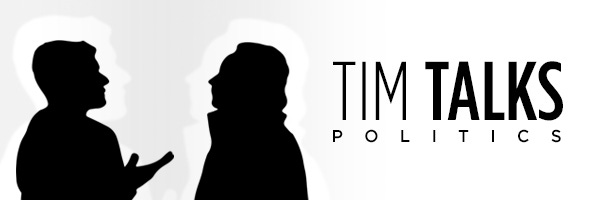Tim Talks Politics - The Weekly Brief, April 6, 2018

The Weekly Brief - April 6, 2018
No foolin’
Since this is the first week of April, it’s still April Fool’s season. Perfect excuse to lead with Foreign Policy’s memo on force posture for the Avengers in the emerging 2018 threat environment.
Tariffs? What tariffs?
Markets seemed untroubled this week by the economic saber-rattling of China and the US over tariffs. That may be because Goldman Sachs said the economic impact of the tariffs would be limited, or Pew Research presented evidence that tariffs on Chinese imports are actually lower than those on most other Asian countries.
However, this doesn’t mean that the tariffs are having no effect. Asia Times reports that they’re already impacting US factories… negatively. Other potential reasons why the markets don’t seem concerned about a looming trade war may be due to domestic economics and politics.
The lower corporate tax rate seems to be contributing to reinvestment in US jobs and plants, and Trump is enjoying some rare bipartisan backing on his tariff hike. Still, the Council on Foreign Relations cautions against taking a cue from what may only be short-term gains.
That may be a difficult lesson to learn. FiveThirtyEight found that in simulated trade scenarios, readers preferred trade wars to cooperation.
They come in threes
Tuesday marked a critical juncture in the diplomatic terrain of the Middle East as the unofficial Turkey-Iran-Russia alliance became more official with the first meeting of the troika’s respective heads of state. On the surface, it looks like another diplomatic triumph for Vladimir Putin at the expense of Donald Trump.
However, Putin has expended large amounts of capital to get to this point and may be “overplaying his hand.”
For his part, whether by accident or on purpose doesn’t matter, Donald Trump’s comments on the future of America’s presence in Syria and invitation to Putin to visit Washington appear to have effectively undercut the nascent alliance.
Trump may have scored additional diplomatic points in the region as Al-Monitor reports that Hamas is willing to open communication channels with the US.
The possibility of losing a regional proxy to US influence cannot possibly sit well with Iran as it faces a possible US withdrawal from the JCPOA.
For his part, Turkey’s Erdogan seems to be feeling bully about his prospects in the region, pledging to step up Turkey’s Syria operations. But here, too, Erdogan may be overreaching as Turkey’s economy is increasingly fragile, even shrinking in terms of living standards and GDP.
SCOF (Supreme Court of Facebook)?
Lawfare is one of the only security and policy sites covering cybersecurity with any consistency and depth. While I’m thankful for their faithfulness on this critical topic, it’s concerning it’s not being talked about elsewhere.
They follow up on the recent cyber attack in Atlanta (did you hear about that one?) with three lessons to be drawn from that event.
More familiar to readers is the ongoing saga of Facebook’s PR meltdown over user privacy issues. The Federalist notes the odd cognitive dissonance of liberal culture turning on Zuckerberg while Lawfare assesses Zuckerberg’s teased Facebook governance structure.



